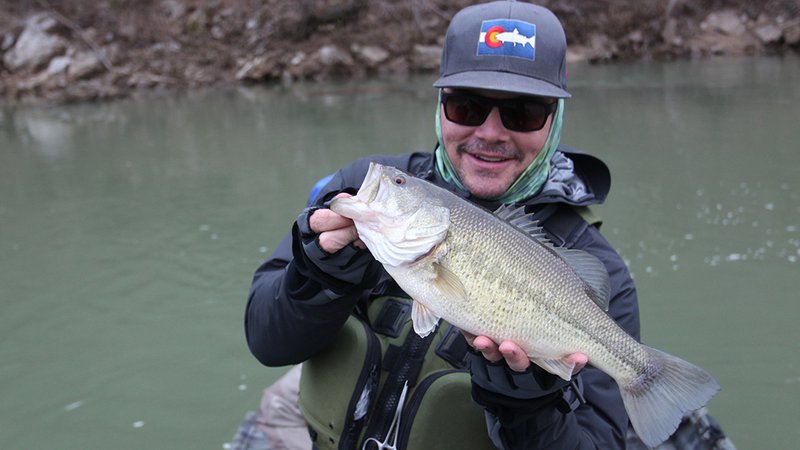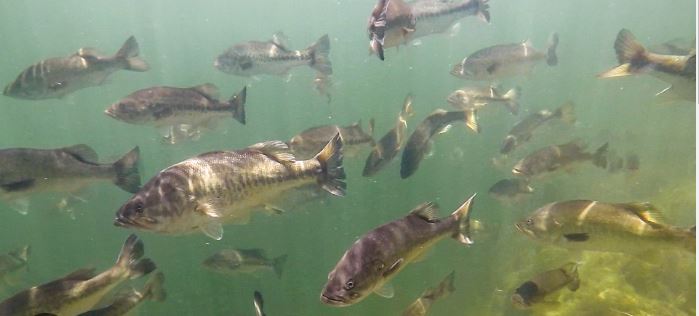Table of Contents
Toggle
What do bass do in the winter? This is a question that scares and intimidates many bass anglers every year.
It is true that winter bass behavior makes it more difficult to catch them, but that doesn’t mean you should hang up you rods.
As long as you know how bass behave and how to fish for them, you will still have tons of success.
In the winter, bass swim out into deeper water towards the middle of lakes and ponds.
In big lake systems, bass might go to waters that are 40+ feet deep.
Now small ponds might only be 10 or less feet in the deepest areas.
Bass will still go into the deepest water available, but in these shallow water ponds, they are more likely to come up shallow during warm fronts or sunny days to warm up.
Bass will also avoid wind during the winter. The wind will cool off the water by as much as 2-3 degrees.
Every lake or pond will have a windy side and a calm side.
When the water is cold, bass shift away from the choppy water and head towards the calm of the lake to be a bit warmer.
As the late fall begins to transition into winter, bass want to be in the warmest water possible during the winter time.
Just like all other creatures, if bass let their body temperatures get too low, they will not be able to move and they will die.
The deeper water is warmer during the winter because it is less exposed to the cold air, wind, and rain.
The deep water also takes longer to warm up in the spring, which forces bass back into shallow waters as temperatures rise.

The cold water temperatures slow down the bass’s metabolism. This makes bass less active, less hungry, and more finicky.
In larger lakes, bass will find a nice deep area of the lake and camp there for pretty much the entire winter.
But, bass act a bit different in smaller ponds that don’t have deep, warm water.
In these small ponds, bass will still spend most of the time in the deepest water, but will come up into shallow waters during warm fronts and the middle of a sunny day.
These bass will specifically target shallow rocks because rocks absorb and hold lots of warmth from the sun.
This makes winter bass fishing from the banks of small ponds very effective. These rocks warm up the shallow water around them.
When the sun starts going down, the bass swim back out to the deep water.
Well yes, bass are still active in the winter, but much less than in other seasons.
Winter bass have slow metabolisms which means that they don’t have much energy. But bass cannot survive the whole winter without eating.
So they do have to be at least a little active in order to eat. Now the slow metabolism helps this because they don’t have to eat as much as normal.
Here is a cool way think about. Winter bass act the same as bass in all other seasons, except they are moving ins slow motion.
They eat much less, and move much slower.

Yes, like I said before, bass still have to eat food during the winter. They will eat much less than in other seasons, but they still do bite.
Bass focus on eating dead or dying prey that is easy to eat and doesn’t take much energy to hunt down.
Dying shad are the main forage of winter bass. If your pond doesn’t have shad, than bass will eat young bluegill and bass that aren’t strong enough to survive the cold winter.

Of course you can. I fish the winter months every year and catch lots of bass.
It can be uncomfortable fishing out in the cold, but there is no reason to stop bass fishing in the winter.
I have caught some of the biggest bass of my life in the cold winter waters.
It depends on how you look at it. Since bass are much less active and eat less in the winter, it can be harder to catch them.
So compared to other seasons, bass fishing is typically seen as not good in the winter. But bass still are eating.
So if you know what winter bass lures to use and how where to fish them, you can see lots of success.
One (and really the only) advantage of wintertime bass fishing is that there is much less competition.
Most anglers take the cold winter months off and just wait for the summer to come around. So waters are less pressured and you can have all the bass to yourself.
Also Read: Warm Winter Day Bass Fishing
Also Read: Best Lure Colors for Winter Bass Fishing
To an extent, bass do still hold to structures during the winter. But you are much more likely to find bass in open waters compared to other seasons.
Like I said before, in small ponds, bass will hang around shallow rocks during the day to warm up as much as they can.
So shallow rocks are the best structure for bass fishing in cold water. But out in very deep water, there typically isn’t all that much structure to find, and bass will focus on deep water rather than finding cover.
Also read: Late Winter Early Spring Bass Fishing
Winter Bass Movement: In winter, bass move to deeper water in lakes and ponds, seeking warmth and avoiding cold air, wind, and rain.
Avoidance of Wind: Bass tend to avoid windy areas during winter, as wind can cool the water, prompting them to shift towards the calm sides of lakes for warmer conditions.
Metabolic Slowdown: Cold water slows down bass metabolism, making them less active and finicky. In larger lakes, they may stay in deep areas, while in smaller ponds, they utilize shallow rocks for warmth.
Winter Bass Activity: Although less active, bass in winter remain somewhat active, focusing on consuming less energy-demanding prey such as dying shad. They continue to bite but with a slower and more deliberate approach.
Winter Bass Fishing: Despite the challenges, winter bass fishing is possible and can be rewarding. The colder months offer less competition from anglers, and understanding the right lures and tactics increases chances of success.
Also make sure you have sharp, sticky hooks to catch bass even when they bite soft.
Q1: Why do bass go deep in the winter? A: Bass seek deeper water during winter for warmth, as it is less exposed to cold air, wind, and rain. Deeper water also takes longer to cool and facilitates their survival in cold temperatures.
Q2: Are bass active in the winter? A: Yes, bass remain somewhat active in the winter, but with a slower metabolism. They still need to eat, focusing on prey like dying shad that requires less energy to capture.
Q3: Can you fish for bass in the winter? A: Yes, fishing for bass in winter is possible. While the colder conditions may be uncomfortable, winter bass fishing offers a unique experience with less angler competition and the chance to catch sizable bass.
Q4: Is bass fishing good in the winter? A: Winter bass fishing can be challenging due to reduced activity, but success is possible with the right lures and techniques. The advantage lies in lower angler competition, providing more opportunities to catch bass during the colder months.
Q5: What are the best lures for winter bass fishing? A: Effective winter bass fishing lures include lipless crankbaits, suspending jerkbaits, drop shots, glide baits, and paddle tail swimbaits. Choosing the right colors for these lures enhances their effectiveness.
Q6: Do bass hold to structure in the winter? A: While bass still exhibit some preference for structure in winter, they are more likely to be found in open waters compared to other seasons. Shallow rocks are a preferred structure in smaller ponds for bass seeking warmth during the day.
Bass slow down and head to deeper warmer waters in the winter seasons. Bass are less active, not inactive.
They still have to find and eat food, which means that you can catch them.
As long as you use the right baits and tactics, the winter can actually be a very effective bass fishing season.
